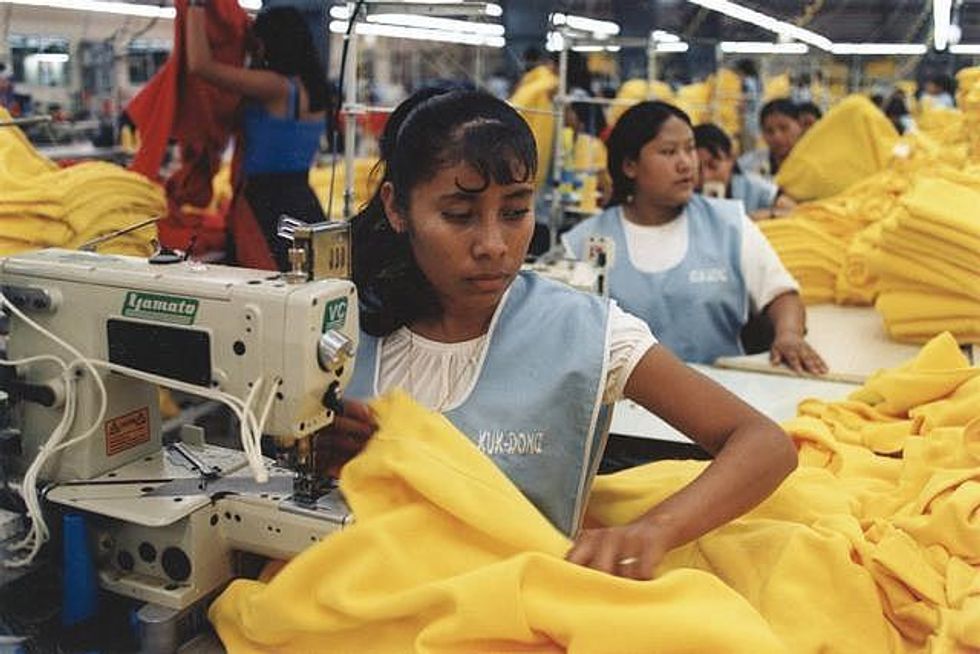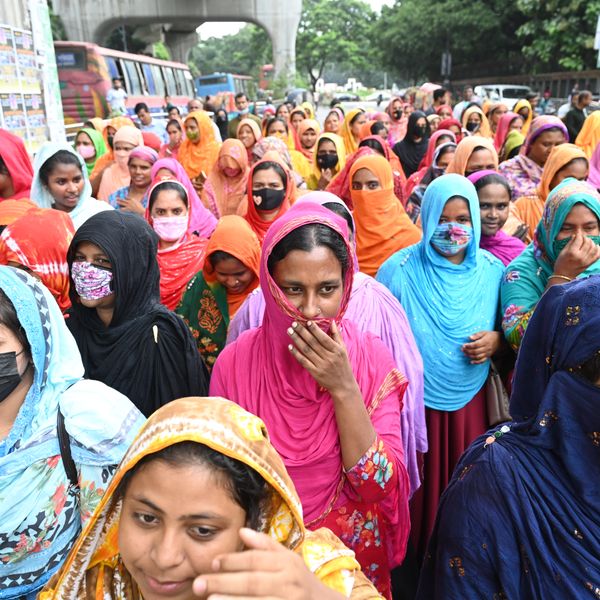US Government Spends Over $1 Billion a Year on Sweatshop Buying Spree
New York Times report cites international trade agreements as catalyst behind poor federal procurement practices

According to a series of interviews and audits obtained by the Times, American government suppliers frequently purchase military apparel, federal employee uniforms and other supplies from companies with reported safety violations and harsh working conditions including padlocked fire exits, buildings at risk of collapse, falsified wage records, underage workers, worker intimidation and, in some cases, torture.
"[Federal agencies] exert less oversight of foreign suppliers than many retailers do," writes Times reporter Ian Urbina. "And there is no law prohibiting the federal government from buying clothes produced overseas under unsafe or abusive conditions."
Speaking to a number of federal procurement officials, Gordon notes that supposed "free-trade" agreements and low-cost-above-all-else mandates have incentivized the federal government away from pushing for fair labor reform or buying practices.
He writes:
The Obama administration, for example, has favored free-trade agreements to spur development in poor countries by cultivating low-skill, low-overhead jobs like those in the cut-and-sew industry. The removal of trade barriers has also driven prices down by making it easier for retailers to decamp from one country to the next in the hunt for cheap labor. Most economists say that these savings have directly benefited consumers, including institutional buyers like the American government. But free-trade zones often lack effective methods for ensuring compliance with local labor laws, and sometimes accelerate a race to the bottom in terms of wages.
An international fair labor law "doesn't exist for the exact same reason that American consumers still buy from sweatshops," Daniel Gordon, a former top federal procurement official, told the New York Times. "The government cares most about getting the best price."
Listing just some of the infractions, Urbina continues:
In Bangladesh, shirts with Marine Corps logos sold in military stores were made at DK Knitwear, where child laborers made up a third of the work force, according to a 2010 audit that led some vendors to cut ties with the plant. [...]
In Chiang Mai, Thailand, employees at the Georgie & Lou factory, which makes clothing sold by the Smithsonian Institution, said they were illegally docked over 5 percent of their roughly $10-per-day wage for any clothing item with a mistake. [...]
At Zongtex Garment Manufacturing in Phnom Penh, Cambodia, which makes clothes sold by the Army and Air Force, an audit conducted this year found nearly two dozen under-age workers, some as young as 15.
Like many western retailers including Walmart and H&M who have been condemned for their support of international sweatshops, federal procurement officials cite the industry practice of hiring suppliers, or middlemen who purchase from factories on the retailers' behalf, as reason for the difficulty in policing their global supply chain.
On Monday it was reported that police in Bangladesh filed the first charges against the owners of the Tazreen Fashion Ltd. garment factory where a November 2012 factory fire killed over 100 workers.
Bloomberg News reports:
Delwar Hossain and his wife, owners of Tazreen Fashion Ltd., and the company's engineer were among 13 people charged under two sections of the law including homicide, A.K.M. Mohsinuzzaman Khan, an inspector of police, said. If convicted, they could face a maximum punishment of life in prison or minimum seven years in jail, he said.
Following that fire, inspectors found among the charred remains order forms for apparel with Marine Corps logos.
_____________________
An Urgent Message From Our Co-Founder
Dear Common Dreams reader, The U.S. is on a fast track to authoritarianism like nothing I've ever seen. Meanwhile, corporate news outlets are utterly capitulating to Trump, twisting their coverage to avoid drawing his ire while lining up to stuff cash in his pockets. That's why I believe that Common Dreams is doing the best and most consequential reporting that we've ever done. Our small but mighty team is a progressive reporting powerhouse, covering the news every day that the corporate media never will. Our mission has always been simple: To inform. To inspire. And to ignite change for the common good. Now here's the key piece that I want all our readers to understand: None of this would be possible without your financial support. That's not just some fundraising cliche. It's the absolute and literal truth. We don't accept corporate advertising and never will. We don't have a paywall because we don't think people should be blocked from critical news based on their ability to pay. Everything we do is funded by the donations of readers like you. Will you donate now to help power the nonprofit, independent reporting of Common Dreams? Thank you for being a vital member of our community. Together, we can keep independent journalism alive when it’s needed most. - Craig Brown, Co-founder |

According to a series of interviews and audits obtained by the Times, American government suppliers frequently purchase military apparel, federal employee uniforms and other supplies from companies with reported safety violations and harsh working conditions including padlocked fire exits, buildings at risk of collapse, falsified wage records, underage workers, worker intimidation and, in some cases, torture.
"[Federal agencies] exert less oversight of foreign suppliers than many retailers do," writes Times reporter Ian Urbina. "And there is no law prohibiting the federal government from buying clothes produced overseas under unsafe or abusive conditions."
Speaking to a number of federal procurement officials, Gordon notes that supposed "free-trade" agreements and low-cost-above-all-else mandates have incentivized the federal government away from pushing for fair labor reform or buying practices.
He writes:
The Obama administration, for example, has favored free-trade agreements to spur development in poor countries by cultivating low-skill, low-overhead jobs like those in the cut-and-sew industry. The removal of trade barriers has also driven prices down by making it easier for retailers to decamp from one country to the next in the hunt for cheap labor. Most economists say that these savings have directly benefited consumers, including institutional buyers like the American government. But free-trade zones often lack effective methods for ensuring compliance with local labor laws, and sometimes accelerate a race to the bottom in terms of wages.
An international fair labor law "doesn't exist for the exact same reason that American consumers still buy from sweatshops," Daniel Gordon, a former top federal procurement official, told the New York Times. "The government cares most about getting the best price."
Listing just some of the infractions, Urbina continues:
In Bangladesh, shirts with Marine Corps logos sold in military stores were made at DK Knitwear, where child laborers made up a third of the work force, according to a 2010 audit that led some vendors to cut ties with the plant. [...]
In Chiang Mai, Thailand, employees at the Georgie & Lou factory, which makes clothing sold by the Smithsonian Institution, said they were illegally docked over 5 percent of their roughly $10-per-day wage for any clothing item with a mistake. [...]
At Zongtex Garment Manufacturing in Phnom Penh, Cambodia, which makes clothes sold by the Army and Air Force, an audit conducted this year found nearly two dozen under-age workers, some as young as 15.
Like many western retailers including Walmart and H&M who have been condemned for their support of international sweatshops, federal procurement officials cite the industry practice of hiring suppliers, or middlemen who purchase from factories on the retailers' behalf, as reason for the difficulty in policing their global supply chain.
On Monday it was reported that police in Bangladesh filed the first charges against the owners of the Tazreen Fashion Ltd. garment factory where a November 2012 factory fire killed over 100 workers.
Bloomberg News reports:
Delwar Hossain and his wife, owners of Tazreen Fashion Ltd., and the company's engineer were among 13 people charged under two sections of the law including homicide, A.K.M. Mohsinuzzaman Khan, an inspector of police, said. If convicted, they could face a maximum punishment of life in prison or minimum seven years in jail, he said.
Following that fire, inspectors found among the charred remains order forms for apparel with Marine Corps logos.
_____________________

According to a series of interviews and audits obtained by the Times, American government suppliers frequently purchase military apparel, federal employee uniforms and other supplies from companies with reported safety violations and harsh working conditions including padlocked fire exits, buildings at risk of collapse, falsified wage records, underage workers, worker intimidation and, in some cases, torture.
"[Federal agencies] exert less oversight of foreign suppliers than many retailers do," writes Times reporter Ian Urbina. "And there is no law prohibiting the federal government from buying clothes produced overseas under unsafe or abusive conditions."
Speaking to a number of federal procurement officials, Gordon notes that supposed "free-trade" agreements and low-cost-above-all-else mandates have incentivized the federal government away from pushing for fair labor reform or buying practices.
He writes:
The Obama administration, for example, has favored free-trade agreements to spur development in poor countries by cultivating low-skill, low-overhead jobs like those in the cut-and-sew industry. The removal of trade barriers has also driven prices down by making it easier for retailers to decamp from one country to the next in the hunt for cheap labor. Most economists say that these savings have directly benefited consumers, including institutional buyers like the American government. But free-trade zones often lack effective methods for ensuring compliance with local labor laws, and sometimes accelerate a race to the bottom in terms of wages.
An international fair labor law "doesn't exist for the exact same reason that American consumers still buy from sweatshops," Daniel Gordon, a former top federal procurement official, told the New York Times. "The government cares most about getting the best price."
Listing just some of the infractions, Urbina continues:
In Bangladesh, shirts with Marine Corps logos sold in military stores were made at DK Knitwear, where child laborers made up a third of the work force, according to a 2010 audit that led some vendors to cut ties with the plant. [...]
In Chiang Mai, Thailand, employees at the Georgie & Lou factory, which makes clothing sold by the Smithsonian Institution, said they were illegally docked over 5 percent of their roughly $10-per-day wage for any clothing item with a mistake. [...]
At Zongtex Garment Manufacturing in Phnom Penh, Cambodia, which makes clothes sold by the Army and Air Force, an audit conducted this year found nearly two dozen under-age workers, some as young as 15.
Like many western retailers including Walmart and H&M who have been condemned for their support of international sweatshops, federal procurement officials cite the industry practice of hiring suppliers, or middlemen who purchase from factories on the retailers' behalf, as reason for the difficulty in policing their global supply chain.
On Monday it was reported that police in Bangladesh filed the first charges against the owners of the Tazreen Fashion Ltd. garment factory where a November 2012 factory fire killed over 100 workers.
Bloomberg News reports:
Delwar Hossain and his wife, owners of Tazreen Fashion Ltd., and the company's engineer were among 13 people charged under two sections of the law including homicide, A.K.M. Mohsinuzzaman Khan, an inspector of police, said. If convicted, they could face a maximum punishment of life in prison or minimum seven years in jail, he said.
Following that fire, inspectors found among the charred remains order forms for apparel with Marine Corps logos.
_____________________

